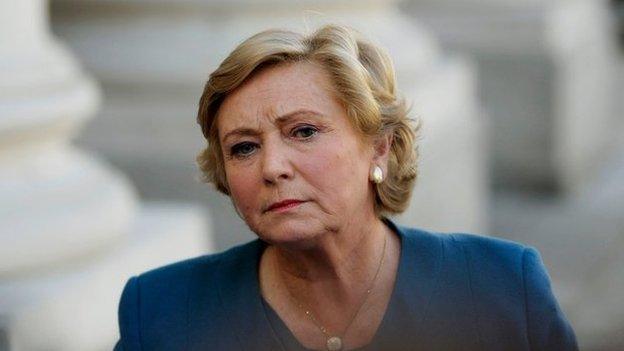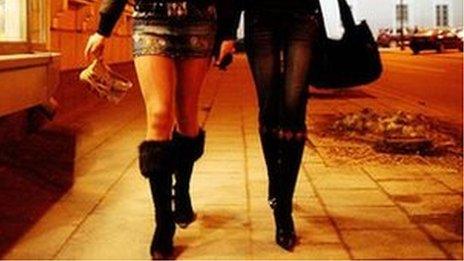Prostitution: Irish government introduces new law to make paying for sex a crime
- Published

Irish Justice Minister Frances Fitzgerald said her proposed legislation to criminalise the buying of sexual services reflected an "all-island consensus to targeting the predominantly exploitative nature of prostitution"
Wide-ranging reforms to sex offences legislation, including a new law making it a crime to pay for sex, have been proposed by the Irish government.
Irish Justice Minister Frances Fitzgerald published a draft sexual offences bill on Thursday, which outlined a raft of planned changes.
If passed, the bill will create new offences of purchasing sexual services, in the context of prostitution.
A similar law is currently progressing through the Northern Ireland Assembly.
'All-island consensus'
Stormont's Human Trafficking and Exploitation Bill was introduced last year by the Democratic Unionist Party (DUP) peer Lord Morrow.
If passed, it would make Northern Ireland the first part of the UK to criminalise people who buy sexual services from prostitutes.
Last month, the Northern Ireland Assembly voted by 81 to 10 in favour of making it a crime to pay for sex, but the bill still has some way to go before it becomes law.
At present, prostitution legislation on both sides of the Irish border criminalises those who sell sex, not those who pay for it.
In a statement on Thursday, Ms Fitzgerald said her proposed bill "reflects an all-island consensus to targeting the predominantly exploitative nature of prostitution".
'Target the demand'
The draft legislation includes the creation of a general offence of purchasing sexual services and a second "more serious offence" of purchasing a sexual service from a trafficked person.
"In both cases, the persons selling the sexual service will not be subject to an offence," the Irish Department of Justice said.
"Unlike the existing offences relating to prostitution such as soliciting, loitering or brothel keeping, this offence will specifically target the demand for prostitution."
Ms Fitzgerald noted that Canada and some Nordic countries were taking a similar approach, in a bid to criminalise those who pay for sex.
The Irish bill also proposes new criminal offences to protect children against sexual grooming, and measures to strengthen the supervision and monitoring of sex offenders on their release from prison.
Age of consent
It will provide judges with the power to ban sex offenders from working with children and vulnerable people for a set time period when they are passing sentence in sex abuse cases.
The minister is also proposing court changes aimed at "minimising the trauma on victims of sexual offences, particularly children", that will allow them to give evidence from behind a screen.
Her bill also aims to rectify a "gender anomaly in incest law" which will align penalties for an offence committed by either a man or women if they abuse members of their own families.
The bill proposes that the age of sexual consent remains at 17 in the Republic of Ireland.
However, it will introduce an exemption clause for what the department described as "non-exploitative, consensual sexual relationships between peers where there is no more than two years in age difference between both parties".
- Published21 October 2014
